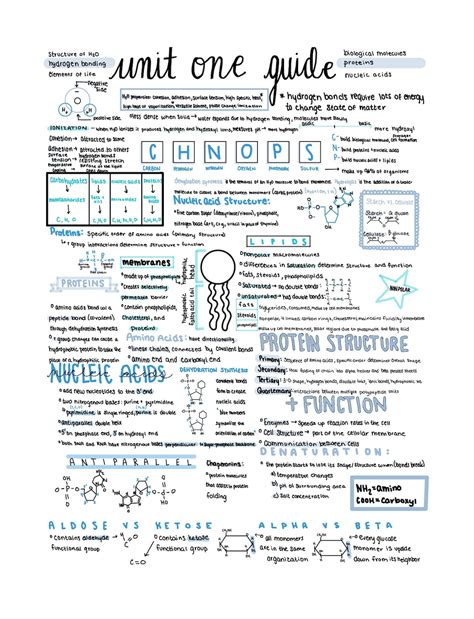Mastering the Fundamentals of Life

Introduction
AP Biology Unit One lays the foundation for understanding the intricate complexities of life. This comprehensive review will empower you to master the essential concepts, prepare for the exam, and unlock a deeper appreciation for the biological world.
Core Concepts of the Unit
The Nature of Science (20-25%)
- Scientific inquiry and the process of science
- Scientific theories and hypotheses
- The role of evidence and experimentation
Chemistry of Life (25-30%)
- Atomic structure and bonding
- Chemical reactions and energy
- Biomolecules (carbohydrates, lipids, proteins, nucleic acids)
- pH and buffers
- Water and its biological significance
Cells and Cellular Processes (45-55%)
- Prokaryotic and eukaryotic cells
- Cell structure and function
- Cell cycle: mitosis and meiosis
- Energy transformations: photosynthesis and cellular respiration
- Membrane transport and signaling
Review Strategies
1. Start Early: Don’t cram everything in the last few days. Start reviewing early and allocate ample time for each topic.
2. Active Recall: Engage with the material by actively recalling information without looking at notes. Use flashcards, practice questions, or teach the concepts to someone else.
3. Understand the Big Picture: Focus on comprehending the overarching concepts rather than memorizing isolated facts. Connect the different topics and see how they fit together.
4. Utilize Resources: Take advantage of online resources, textbooks, videos, and practice exams to supplement your understanding.
5. Seek Support: Don’t hesitate to ask your teacher, classmates, or a tutor for help when needed.
Tips and Tricks
- Use Mind Maps: Create visual representations of the concepts to enhance understanding and recall.
- Summarize key terms and theories: Condense complex concepts into brief and clear summaries.
- Solve Practice Problems: Regularly work through practice problems to test your understanding and identify areas for improvement.
- Focus on High-Yield Topics: Prioritize studying topics that have the highest probability of appearing on the exam.
Common Mistakes to Avoid
- Memorizing Instead of Understanding: Don’t just memorize facts; strive to understand the underlying principles and relationships.
- Neglecting Scientific Inquiry: Underestimating the importance of scientific inquiry can lead to misconceptions about the process of science.
- Overlooking Biomolecules: Thoroughly review the structure and function of biomolecules, as they are crucial for understanding cellular processes.
- Confusing Prokaryotic and Eukaryotic Cells: Clearly distinguish between the characteristics and functions of prokaryotic and eukaryotic cells.
- Underestimating the Significance of Water: The properties and biological roles of water cannot be overstated, so give them adequate attention.
Frequently Asked Questions (FAQs)
-
What percentage of the exam covers Unit One?
Approximately 20-25%
-
How much time should I spend reviewing for Unit One?
Plan for at least 25-30 hours of dedicated review.
-
Which topics are most heavily weighted on the exam?
Chemistry of Life and Cells and Cellular Processes
-
How can I strengthen my understanding of scientific inquiry?
Engage in hands-on experiments, analyze scientific literature, and discuss the nature of science with your classmates.
-
What is the best way to prepare for the free-response questions?
Practice writing clear, concise, and well-organized responses to previous exam prompts.
-
Any advice for memorizing the numerous biomolecules?
Create mnemonic devices, group biomolecules by function, or use visual aids like charts or diagrams.
Conclusion
Mastering AP Biology Unit One requires a comprehensive understanding of the fundamental principles of life. By following the review strategies, tips, and tricks outlined in this article, you can effectively prepare for the exam and embark on a journey of scientific discovery. Remember, the pursuit of biological knowledge is not only about passing a test but also about gaining a profound appreciation for the intricacies of life.
